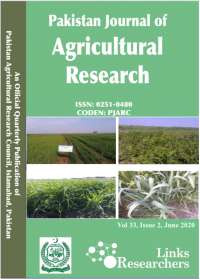1Pakistan Agriculture Research Center, Arid Zone Research Institute, Bahawalpur, Pakistan; 2Institute of Agricultural Resources and Regional Planning, Chinese Academy Agricultural Sciences Beijing, China; 3Department of Biology University of Okara Pakistan; 4Department of Horticultural Science, Faculty of Agriculture and Environmental sciences, The Islamia University of Bahawalpur, Pakistan; 5Excotology Research Program, National Agriculture Research Center (NARC) Islamabad, Pakistan; 6National Institute for Genomic and Advance Biotechnology NARC Islamabad, Pakistan.
*Correspondence | Malik Muhammad Yousaf, Pakistan Agriculture Research Center, Arid Zone Research Institute, Bahawalpur, Pakistan;
Email: [email protected],
[email protected]
ABSTRACT
Among arid zone plant species, Jojoba (Simmondsia chinensis), being an evergreen, perennial, multi-stemmed, and multipurpose plant has attracted wide attention due to its economic value, potential by-products and ability to withstand vagaries of the desert environment. By realizing the economic importance of this high-value desert plant, a pioneer study on seed germination response to various agro-climatic factors was conducted at the Arid Zone Research Institute Bahawalpur. Healthy jojoba seeds were sown at the fortnightly intervals by dividing the whole year into 16 treatments to identify the optimum sowing time for the Cholistan desert of Bahawalpur. The results revealed that maximum germination rate of 85.63%, 85.93%, and 82.83% were found in treatment 16th September during the whole study period (2011-14). The 16th of March, 16thSeptember, and 1st August were the other suitable sowing times for jojoba as these showed 82.37%, 75.47%, and 71.57% of germination respectively.
To share on other social networks, click on any
share button. What are these?






